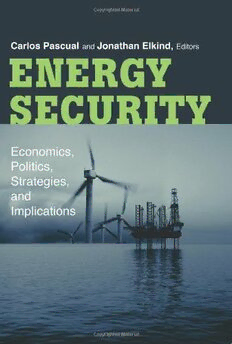
Energy Security: Economics, Politics, Strategies, and Implications PDF
288 Pages·2009·6.794 MB·English
Most books are stored in the elastic cloud where traffic is expensive. For this reason, we have a limit on daily download.
Preview Energy Security: Economics, Politics, Strategies, and Implications
Description:
Energy security has become a rallying cry in recent years, especially in the wake of increased terrorist threats in the Middle East and elsewhere. But what does the term energy security really mean? For many it is ensuring the safe supply and transport of energy as a matter of national security. For others, it is developing and moving toward sustainable, low-carbon energy sources to avoid environmental catastrophe. Still others view it as increasing oil drilling to achieve independence from foreign markets and ensure affordability. Yet the fact remains that the vast majority of global energy production still comes from fossil fuels, and it will take a thorough understanding of the interrelationships of complex challenges—finite supply, environmental concerns, political conflict, and economic volatility—to develop policies that will lead to true energy security. This volume presents a realistic, cross-disciplinary look by recognized authorities at the global quest for energy security. While each nation faces different geopolitical, economic, and environmental challenges, the prescriptions offered here could well lead us in the right direction. Contributors include William Antholis (Brookings), Jason Bordoff (White House Council on Environmental Quality), Marilyn A. Brown (Georgia Institute of Technology), Erin E. R. Carter (Brookings), Manasi Desphande (National Economic Council), Erica Downs (Brookings), Ann Florini (Brookings), Suzanne Maloney (Brookings), Pascal Noel (National Economic Council), Pietro Nivola (Brookings), Michael O Hanlon (Brookings), Andrea Sarzynski (George Washington University), Frank Southworth (Georgia Institute of Technology), Evie Zambetakis (Brookings)
See more
The list of books you might like
Most books are stored in the elastic cloud where traffic is expensive. For this reason, we have a limit on daily download.
